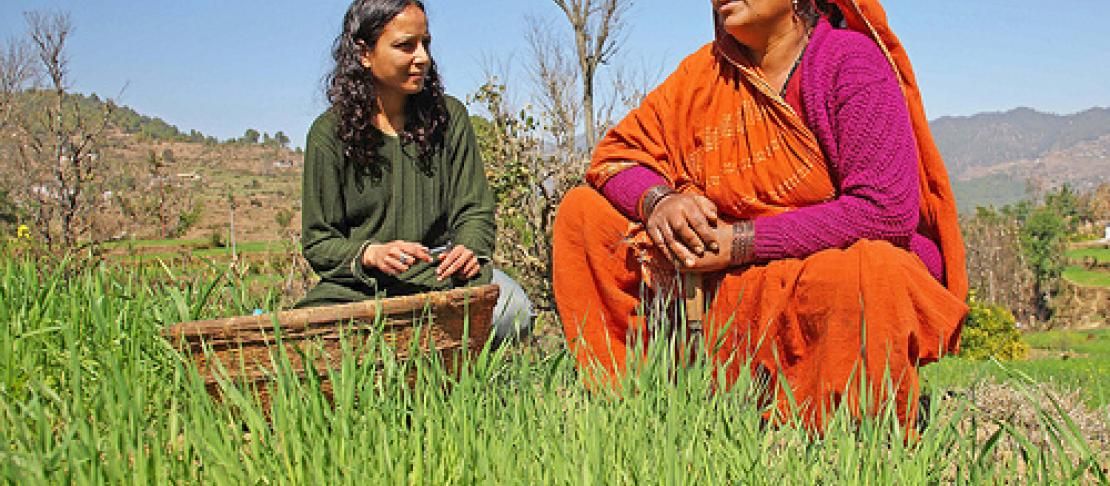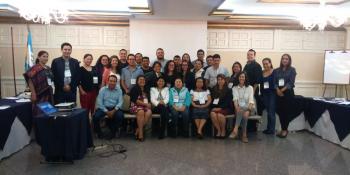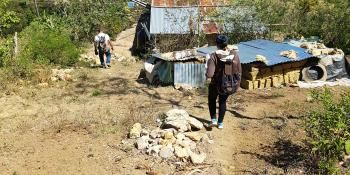Spotlight on gender and food security: Bangladesh

It is recognized that women are more vulnerable to climate change, since their lives and livelihoods are dependent on nature and agriculture. “Similar to other places in developing countries, women in my study area have little understanding about climate change and its induced impact on their lives and livelihood” explains Gulsan Parvin.
She conducts research in the Horikhali village in Paikgacha, Khulna in Bangladesh, focusing on the role of microfinance institutions in enhancing food security in a climate change context. “However” Gulsan continues, “climate change is affecting coastal communities, as well as other manmade factors. This is changing women’s livelihoods, increasing hardship in their daily life and lowering food security.”
A number of microfinance institutions (MFI) are trying to create alternative employment opportunities for women by providing microcredit. “But”, says Gulsan, “Microfinance institutions also have limited understanding about climate change and its impact on women’s life. This is why there is a great need to conduct research on gender and climate change issues focusing on how institutional efforts, such as microfinance, can help women adapt to impacts of climate change”.
Different roles and responsibilities means different impact of climate change
Regarding existing gender differences and roles and responsibilities of women and men in this specific geographical location, Gulsan explains that they are distinct. “In Bangladesh, rural women are responsible for household work, such as food preparation, water and fuel collection, and taking care of the family. Additionally, most poor women need to also earn an income through shrimp fry collection from rivers and estuaries, cleaning weeds from shrimp farms and earth work related to shrimp farming (gher)”. She continues: “Men are mainly engaged in fishing, shrimp field preparation, shrimp farming, van and rickshaw pulling, and working as day labors in nearby towns”.
Shrimp culture and climate change impacts (e.g. salinity intrusion and the impact of Cyclone Aila) have negatively affected the livelihood of the poor, especially that of poor, rural women. Their daily labor and hardship has been severely increased. “Agricultural activities have been almost demolished in the study area due to salinity intrusion. Rice production decreased two to three times, and green spaces and vegetation decreased significantly” says Gulsan. These changes are predicted to continue due to climate change. Consequently, women’s food security will be threatened more than men since women’s prime income earning activities based on shrimp collection will be harder due to climate change as fish and shrimp fry habitats are destroyed due to increase in salinity with sea level rise. Gulsan adds: “Compared with men, women have fewer opportunities to search for alternative livelihoods to cope or adapt to climate change”.
Addressing gender gaps in relation to climate change and food security
Gulsan Parvin’s research aims to examine the role of MFIs to enhance food security of women in the context of climate change. It also intends suggest policies to redesign effective MFIs. Initial findings reveal that the MFIs working in the study areas are doing almost nothing to address climate change and enhance food security of the women. “Instead”, Gulsan explains, “most micro finance recipients mention increase in their debts, hardship, and food insecurity, especially after cyclone Aila in 2009 when situation became severe”. Currently MFIs are not tackling these issues. In this context this research will identify not only the challenges that women face, but also identify the role of MFIs to addresses women’s hardship and food insecurity. “Since MFIs target poor women, thorough investigation and identification of problems and limitations of present MFIs policies are needed to improve to find out how MFIs may be able to address women’s needs in relation to the impact of climate change”. Eventually, this research would help to enhance women’s alternative income opportunities and food security in the context of climate change and thus decrease gender gaps.
Careful question formulation is key
On the question of the kinds of challenges Gulsan has faced during her research, she replies: “It is difficult to differentiate the impact induced by climate change and the impact induced by other factors. Women who are the target group of this research cannot clearly make this distinction”. Since poor, rural people, especially women who have little understanding about climate change, it is difficult and time consuming to get their views about the impact of climate change in their lives, daily labor and food security. Therefore, formulation of questionnaire addressing gender and impact of climate change is complicated.
Getting the message out to farmers and policy makers
Gulsan thinks it is important to build perception and awareness related to climate change among the local community. To build the sense of responsiveness to changes in the environment and biodiversity, messages are needed to communicate to the both men and women in the study area about these changes. “It is important to communicate to the farmers -especially the shrimp farm owners- about the long term effect of uncontrolled shrimp farming and conversion of agriculture fields to shrimp farms. Female farmers need to be trained about the importance and ways of homestead gardening, plantation and alternative income generating activities for their food security beyond shrimp farming” explains Gulsan.
When it comes to policy makers, Gulsan emphasizes that they need to address the problems, expectation and potentials of local communities, especially that of women. They need to highlight the role of MFI and their need to address climate change and food security when offering loans to women. She concludes: “Policy makers should also highlight the need to create a balance between agriculture and shrimp farming, and to evaluate the role of these two activities in climate change adaption and environmental protection”.
Learn more about Gulsan Parvin's research by downloading her technical progress report (PDF).
Read more about CCAFS gender work in the context of climate change and food security here.
Read more about our gender grant recipients and Gulsan Parvin's reserach here.
This story is based on an interview between gender grant recipient Gulsan Parvin and Moushumi Chaudhury, Science Officer Theme 4.1 Linking Knowledge with Action. The story was edited by Lisen Stenberg.
Interview with gender grant recipient Gulsan Ara Parvin, made by Moushumi Chaudhury and edited by Lisen Stenberg.


